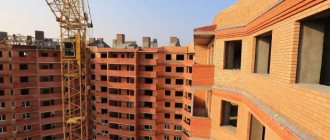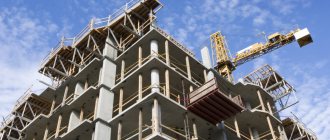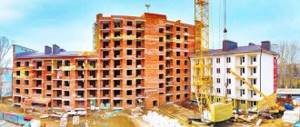In recent years, legislators have taken many steps to increase the level of security of transactions in the primary real estate market. It is natural that there are much fewer “defrauded shareholders”. However, even today the level of reliability of transactions on new buildings is inferior to the reliability of secondary buildings. In this article we will understand what shared construction is, what is its attractiveness and how to protect yourself as much as possible from risks when buying a “new building”.
What is shared construction
New buildings or primary housing are usually called apartments in residential buildings that are still under construction. Developers fully organize all processes of approval, construction work, registration of all procedures for putting objects into operation and registration of ownership.
The construction is financed by participants in shared construction who wish to purchase real estate in houses under construction - investors or, as they are also called, shareholders. The funds paid by the developers when concluding an equity participation agreement (DPA) guarantee that they will receive ownership of the selected apartments. This type of construction is called shared construction because each investor transfers to the developer the share of funds that corresponds to his part of the property in the object being built.
Taxation under DDU
All financial resources contributed by shareholders are raised as investments in the facility under construction. Further, in accounting, they are distributed to funds spent on the construction of the building, and to funds that are classified as remuneration for the services of the developer in the equity participation agreement.
After completion of construction of the facility, an accounting analysis is carried out on costs and funds received. Accordingly, the amount of costs is subtracted from the total amount, resulting in the resulting taxable profit.
The shareholder, in the process of registering an agreement for participation in shared construction in Rosreestr, is obliged to pay a state fee. It is set in the following size:
- upon registration of preschool education: 350 rubles;
- when registering additional agreements to the contract: 350 rubles.
Benefits and risks of shared construction
In shared construction, one party to the transaction is always only a legal entity - the developer. The second party (an individual or legal entity) is usually called the buyer, but in fact it is not a buyer, but for now only an investor.
Important! When purchasing an apartment in a new building, the buyer does not acquire the right of ownership, but the right of claim.
This means that by concluding an agreement with the developer and paying funds for the purchased apartment, the future owner does not buy the apartment itself, but the right to demand registration of its ownership in his name in the future, when the house is commissioned. The reason is that housing that has not yet been built is not owned and therefore cannot be sold or bought. At the same time, the DDU is registered with Rosreestr and subsequently becomes the basis for ownership of the apartment.
For investors, concluding such agreements is attractive for several reasons:
- the cost of apartments in new buildings is significantly lower than similar “resales”;
- the purchase price is comparable to the most inexpensive resales, but at the same time the area and comfort of apartments in a modern house are incomparably higher;
- primary housing does not have a legal history, which provides protection from most risks when purchasing secondary housing;
- a wide selection of modern residential complexes, housing classes (and, therefore, the social level of neighbors), physical characteristics of apartments and many other components of the future lifestyle;
- by purchasing a “primary” property using borrowed funds, the investor receives a significantly lower mortgage rate;
- purchasing a “primary” property for subsequent resale is always a guarantee of making a profit in the future, because at each successive stage of construction the market value of the object increases.
But along with obvious benefits, buying apartments under the DDU is also associated with risks:
- the conclusion of the DDU does not imply the possibility of immediate settlement; the completion of construction will have to wait from several months to one and a half to two years;
- Along with the acquisition costs, it is necessary to take into account the costs of subsequent repairs and interior design - on average from 1-1.5 million rubles;
- the investor's right of claim guarantees entry into ownership after the house is put into operation, but does not guarantee that the house will ever be completed;
Thus, it is important from the very beginning to take into account all the pros and cons associated with investing in shared construction.
The concept of DDU, decoding in construction
DDU - decoding in construction, what is it?
The DDU agreement, which stands for equity participation agreement, has a specific legal nature and therefore requires a detailed explanation. Such legal relations are regulated by the following regulations:
- Federal Law No. 124 on shared participation in construction, which regulates the basic rights and obligations of the parties (participants), gives the concept of shared ownership, and also establishes a typical contract;
- The Civil Code, which regulates the basic concepts of contracts.
Now let's look at what DDU is. As stated earlier, this is an equity participation agreement.
That is, one party, always the developer, enters into an agreement with the shareholder (individual or legal entity). The bottom line is that the construction company will build a residential building at the expense of funds that the shareholder(s) will contribute for some time.
The end of such agreements is the transfer of the property to the shareholder and the registration of ownership of it.
Based on this DDU, it includes the following mandatory requirements:
- conclusion of a written agreement between the developer and the shareholder;
- making periodic payments for the future property (mandatory share in the construction project);
- registration of ownership after putting the house into operation.
It is interesting to know that the equity participation agreement, in its legal nature, is similar to the agreement concluded in Soviet times between citizens and construction organizations for the construction of cooperative houses.
Protection of shareholders during shared construction by law
Currently, there are several ways to legally purchase apartments in new buildings, and DDU is not the only one.
Important! The possibility of concluding a shared participation agreement is regulated only by Federal Law No. 214-FZ on participation in shared construction and is the most legally safe way to acquire a “primary property”.
However, not all developers can offer a transaction scheme “according to 214”. Even in the capitals, about 40% of construction companies offer the opportunity to join housing cooperatives, purchase a housing certificate, as well as various “gray” schemes. The fact is that the requirements of 214-FZ, designed to provide shareholders with maximum security, impose quite strict obligations on developers and maximum transparency of activities while providing the investor with the opportunity to terminate the contract at any time, noticing its non-compliance. Of course, not every construction company is satisfied with operating within such a strict framework.
What guarantees does the buyer have in case of bankruptcy of the developer or bank?
If the developer is declared bankrupt, the buyer does not have to worry about losing the funds: they are frozen in the bank account in any case. At your discretion, you can either withdraw money from the account, or (if the house is almost completed) demand that the apartment be transferred. Also, in the event of bankruptcy of the developer, shareholders can find another company that will complete the construction of the facility.
If the buyer decides to enter into shared construction and chooses a reliable company, but the bank goes bankrupt, he will be able to get back up to 10 million rubles (depending on the cost of the apartment for which construction was paid). This amount of payment is provided for by the insurance program (the state insures funds in bank accounts for up to 10 million rubles).
Insurance
Since 2014, the law obliges developers to insure their liability to investors. There are no options for avoiding the fulfillment of this obligation: the absence of an insurance contract makes registration of equity participation agreements in Rosreestr impossible. However, the implementation of this initiative in the form in which it was conceived turned out to be impossible. Therefore, in 2017, amendments were introduced to guarantee the investor, if not timely registration of ownership of the apartment, then at least compensation for the invested funds.
The construction company has the right to choose one of three insurance options:
- A guarantee from a bank that meets the legal requirements for issuing such guarantees.
- Membership in a non-profit organization that has its own insurance fund for the activities of its participants.
- An agreement with an insurance company that has the right to provide services for this type of insurance.
The most common is the third method as the most accessible, however, for the developer it is associated with certain difficulties, since only a very small number of insurance companies can be proud of their ability to meet the legal requirements for providing services for this type of insurance.
What other important information should the DDU contain?
Description of the property. All premises included in the apartment must be described in detail. We are talking not only about living rooms, but all additional rooms must also be described: loggias, balconies, verandas, etc. Their footage must be indicated, and a diagram of the location of individual rooms in a given apartment must be presented.
In addition, it is necessary to indicate on what floor the housing is located, the apartment number, what materials the external walls of the building and staircases are made of, as well as what seismic resistance class they belong to. Also, the share participation agreement must contain the construction address of the object and the cadastral number of the site.
Construction completion dates. The deadline for when the property will be completed and transferred to the shareholder must be clearly indicated. This point is very important, because if construction is delayed, the participant has the right to demand a penalty from the developer, which will be calculated from the time specified in the contract.
Contract price. It is necessary not only to indicate the full cost of the apartment, but also the method and procedure for depositing money. If you intend to pay the amount in installments, then it is necessary to clearly outline the payment periods. Moreover, the shareholder needs to know that when calculating the price per sq.m. loggias, balconies and verandas a reduction factor is applied.
Guarantee period. The contract must indicate the developer's warranty obligations for the transferred housing, which cannot be less than what the legislator established: 5 years for the structure, 3 years for communications.
Insurance obligations. The document must reflect the method of insuring the developer's liability. This could be a bank guarantee, an agreement with an insurance company, or membership in the OBC. The shareholder should be aware that the insurance period must be two years longer than the duration of the DDU.
All information listed is mandatory. It is impossible to draw up an agreement that does not contain at least one of these clauses. It will not be registered and will be declared void.
The contract must cover the following details:
- Full parameters and characteristics of the new building and the purchased apartment.
- Timing of completion of construction work and commissioning of the facility.
- Figures for the cost of the apartment, payment repayment mechanisms.
- Responsibilities of the parties and the procedure for fulfilling the conditions.
- Mutual guarantees.
- Information about the legal status of land and documentation for it.
When the state registration of an equity participation agreement takes place in Rosreestr in accordance with all the rules, the document itself will indicate this with special markers. The entry is placed on the back where there is enough free space. It should contain:
- Government department stamp.
- Signature of an authorized specialist.
- Registrar's stamp.
- Registration number indicating that the property has been entered into the database and registered.
Collection of penalties and refund
To draw up a penalty and go to court, it is best to use qualified legal assistance. However, even when drawing up a claim yourself, you should rely on the existing regulatory framework. The claim is drawn up on the basis of Articles 6 and 10 of Federal Law No. 214-FZ, Articles 309-310 of the Civil Code of the Russian Federation and with reference to the violated terms of the contract. The document is sent to the legal and actual addresses of the developer (it is better to find out the first for sure by ordering an extract from the Unified State Register of Legal Entities) and is delivered personally or by mail, by registered mail with a list of the attachments. A note indicating receipt of the claim by the developer is necessary for further proceedings in court.
The amount of the penalty is calculated based on the date the developer transfers the apartment to the investor under an equity participation agreement. Moreover, it is important to take into account both the period specified in the contract itself and the final amount of the penalty - if the plaintiff mistakenly overestimates it, the court will still make a calculation according to the law, but the final amount exceeding 1 million rubles entails mandatory payment of a state fee.
Essential points of the DDU
Many citizens tend to sign contracts “without looking,” especially if the document has a large amount of text, replete with legal terms and formulations that stretch thoughtful reading for more than one hour. But it is necessary to carefully read the DDU and clarify all unclear questions before signing in order to secure your own transaction.
Important! Care when signing a DDU is an important component of the security of the interests of the shareholder. Therefore, it is necessary to allocate sufficient time for a trip to the developer’s office to study and sign documents.
What you need to pay special attention to in the share participation agreement:
- Shared construction facility. The developer must provide all project documentation, construction address, series of residential building, its number of floors and the floor of the apartment being purchased, its area and layout.
- Cost and payment procedure - one time or in several stages; rights and obligations of the parties.
- Deadlines. A period is determined after which the house must be put into operation, the apartments must be registered in the cadastral register and registered in the name of the new owners. The developer also undertakes to provide investors with information about the progress of work during the construction process through open publication of reports.
- Responsibility of the parties in case of violation of obligations under the contract.
It is important that all information in the contract that is subject to verification is true, and all questions that are not completely clear to the investor are clarified before signing, or even better, before visiting the sales office.
Notarization of a share participation agreement will protect shareholders from fraud
According to 214-FZ, an agreement on shared participation in the construction of a residential building does not require mandatory notarization and comes into force after its state registration. However, do not neglect notarization. Notary Alexey Komarov (Notary Office of Alexey Komarov, St. Petersburg) talks about how notarization of an agreement can protect shareholders from the appearance of dubious terms of ambiguous interpretation in the agreement, as well as from banal fraud. About the procedure for notarization of a contract Notarization of a contract usually takes place in the office of a notary office. The buyer and an authorized representative of the developer are present. The notary, as a representative of the law, ascertains the legal capacity and capacity (powers of the developer) of the parties to the agreement, the legality of the transaction being concluded. Special attention is paid to the agreement’s compliance with the imperative norms (mandatory conditions) of 214-FZ, since if the agreement does not contain the conditions provided for in Part 5 of Article 4 of this law, the agreement on shared participation in construction is considered not concluded. In relation to the developer, it is mandatory to check the construction permit issued by the authorized government body; ownership of the land plot and the permitted type of its use, the constituent documents of the developer and the sufficiency of the powers of his representative to sign the share participation agreement. Since the legislator establishes not only mandatory (mandatory) but also dispositive (at the discretion of the parties) ways of regulating the relationships between participants in the shared construction of a residential building, the notary explains to the parties what rights and obligations they have after signing and state registration of the agreement, as well as the legal consequences of the transaction transactions. The notary determines the compliance of the parties’ will with the terms of the transaction being concluded. A uniform understanding of the rights and obligations under the contract is a guarantee of the absence of conflicts between the parties in the future.
How notarization of a shared participation agreement will protect against fraud “A participant in shared construction most often has no experience in the field of real estate, he is very far from this area,” says notary Alexey Komarov. “Therefore, some formulations and phrases written in the agreement, which seem to him to be completely legitimate and in line with his interests, may in fact turn against him. Swindlers, it should be noted, have been present on the real estate market for many years, work practically legally and know how to draw up the text of an agreement in such a way that the shareholder may lose the money he has invested as a result. And if everything was legally formalized correctly and signed voluntarily, unfortunately, little can be done to protect the rights of a participant in shared construction. Therefore, before signing a shared construction agreement, it is worth contacting a notary who, in addition to verifying the identity of the parties and the very fact of the transaction, will thoroughly analyze the agreement. In addition, the notary is fully responsible for all transactions certified by him, thanks to which you will avoid fraud and protect yourself from unscrupulous developers.” Along with ensuring the legal security of concluding an equity participation agreement, it makes sense to pay attention to the obvious facts of the developer’s company’s activities. Look at what stage of construction the property is at, make inquiries about the development company, already built facilities, talk to residents to determine their satisfaction with the purchase. “It would not be superfluous to recall that a notary engaged in private practice bears full property liability for damage caused to the property of a citizen or legal entity as a result of an unlawful notarial act (Article 17 of the Fundamentals of the Legislation of the Russian Federation on Notaries). Compensation for damage is carried out at the expense of insurance compensation, and if it is insufficient, at the expense of the property of such a notary,” summarizes Alexey Komarov.
Alexey Komarov.
How to choose a bona fide developer
It would seem that the opportunity to “get right” with the developer is close to chance. However, professional real estate agencies successfully check developers in the same way as checking the “legal purity” of apartments on the secondary market. The only difference is that in the case of checking a new building, several other factors are subject to verification. This is one of the reasons why the belief that you don’t need an agency to buy a new home is a common misconception. However, to the extent possible, an “independent” investor can also try to replicate the professional experience of realtors.
What documents should the developer have?
First of all, it is necessary to check the project declaration, which the developer is obliged to provide upon request. This document contains information about the activities of the developer and the construction of the facility in which the future investor plans to purchase an apartment. In addition, the most important information in the project declaration is information about other objects, the construction of which was carried out by the developer over the past 3 years. The project declaration publishes the location of these objects, the timing of commissioning and the compliance of the developer’s activities with the obligations assumed. In addition, the project declaration contains information about the financial condition of the developer and his current debts. By reading this document, you can get a fairly clear idea of the reliability of the construction company.
No less important is information about the object of future investment: deadlines for completing the stages and putting the house into operation, information about non-residential premises, the total cost of construction, insurance and other ways in which the developer can guarantee the security of the transaction for the investor.
Information about the developer
In addition to the project declaration, it is important to study other information. These include the relevance of information about the registration of a legal entity in the Unified State Register of Legal Entities, clarification of information about the financial condition and possible risks of bankruptcy proceedings, and lawsuits involving this company.
It doesn’t hurt to conduct your own “investigation” - talk to the residents of the completed buildings, if there are any, and study reviews of the developer’s other properties. If those who decided to participate in shared construction before you identified the pitfalls of investing in this developer, information about this will definitely appear. If, in general, the information background is favorable and the bulk of the data obtained testifies in favor of the developer, possible one-time negative reviews should not be embarrassing - dissatisfied people are everywhere. However, the entire check must be carried out carefully.
Cost of square meters
As a rule, for reliable developers the cost per square meter is approximately the same and the fluctuations are insignificant. If the offer price is incredibly low or you are offered a large discount (30% or more) if the contract is signed as soon as possible, these facts should alert you. If the legitimate benefit of the developer in such proposals is not obvious to you, perhaps this particular developer is preparing to declare bankruptcy immediately after collecting the desired amount from investors.
Developer partners
One of the informative (although not always guaranteed) ways to ensure the reliability of a construction company is its partners. Reputable developers who have been working for many years and have a well-deserved reputation usually have an impressive list of partners. If they include serious suppliers of equipment and materials, well-known insurance companies, funds and banks with a high reliability rating, this gives the company the right to trust investors. However, it is important to remember that even among very well-known developers who have had an excellent reputation in the past and partnerships with very respected companies, there are those whose performance results provoke claims and lawsuits from investors much more often than they generate grateful reviews.
An agreement for participation in shared construction is a consensual, compensated, bilateral agreement, drawn up in writing, subject to state registration and considered concluded from the moment of such registration.
The procedure for concluding an agreement for participation in shared construction of housing between the developer and a participant in shared construction in accordance with the requirements of the Law on Shared Construction is preceded by the implementation of certain actions by the developer. The law provides for the right of the developer to attract funds from participants in shared construction for the construction (creation) of an apartment building only after receiving a construction permit in the prescribed manner (Article 51 of the Town Planning Code of the Russian Federation). A precondition for obtaining a building permit is the publication, posting and/or submission of a project declaration. The legislator seeks to ensure transparency in the construction business by obliging the developer, through a project declaration, to provide information about the developer to any applicant for review. The project declaration includes information about the developer and information about the construction project. Articles 20 and 21 of the Law on Shared Construction specify the information that must be included in each of them. For example, information about the developer should contain information: about the company name, location of the developer; on state registration of the developer; about the founders of the developer; about the type of licensed activity, etc. The developer must have a land plot that belongs to him either by right of ownership, or on the basis of a lease or sublease agreement. Thus, the developer has an obligation to state registration of ownership of a land plot, or a lease agreement, sublease of a land plot. After reviewing the documents, a potential participant in shared construction independently assesses all possible risks and decides to enter into an agreement with a specific developer. For concluding civil law contracts, including agreements for participation in shared construction, Chapter 28 of the Civil Code of the Russian Federation (Articles 432-439 of the Civil Code of the Russian Federation) establishes a certain procedure. According to Article 432 of the Civil Code of the Russian Federation, an agreement is considered concluded if an agreement is reached between the parties in the form required in appropriate cases on all the essential terms of the agreement. As for the place of concluding an agreement for participation in shared construction, if the agreement does not indicate the place of its conclusion, it is recognized as concluded at the location of the legal entity that proposed to conclude such an agreement (that sent the offer). An important condition is that persons signing an agreement for participation in shared housing construction must have the necessary powers to do so. For individuals, this means having legal capacity, that is, reaching the age of 18. On behalf of legal entities, the contract may be signed by their bodies or representatives. The procedure for electing or appointing bodies of a legal entity is determined by law and constituent documents. Bodies of a legal entity act on its behalf without a power of attorney, representatives of a legal entity act on the basis of a power of attorney confirming the powers of the representative of the legal entity and the limits of its competence. The power of attorney is issued signed by the head of the legal entity and certified by the seal of this organization. Article 9 of the Law on Shared Construction states: “A participant in shared construction unilaterally has the right to refuse to fulfill the contract in the event of: 1) the developer’s failure to fulfill the obligation to transfer the shared construction object within a period exceeding the period established by the contract for the transfer of such an object by two months; 2) failure by the developer to fulfill the obligations provided for in Part 2 of Article 7 of this Federal Law; 3) a significant violation of the quality requirements for a shared construction project; 4) violation by the developer of the obligations provided for in Part 3 of Article 15.1 of this Federal Law; 5) in other cases established by federal law or agreement. At the request of a participant in shared construction, the contract may be terminated in court in the event of: 1) termination or suspension of the construction (creation) of an apartment building and (or) other real estate object, which includes the shared construction object, in the presence of circumstances clearly indicating that that within the period stipulated by the contract, the shared construction object will not be transferred to the participant in shared construction; 2) a significant change in the design documentation of an apartment building under construction (created) and (or) other real estate, which includes a shared construction project, including a significant change in the size of a shared construction project; 3) changes in the purpose of common property and (or) non-residential premises included in an apartment building and (or) other real estate; 4) in other cases established by federal law or agreement. The developer, in the event of termination of the contract on these grounds, within 20 working days from the date of termination of the contract or in the event of termination of the contract on the grounds set out above, within 10 working days from the date of termination of the contract, is obliged to return to the participant in shared construction the funds paid by him on account contract price, pay interest on this amount for the use of the specified funds. If the participant in shared construction is a citizen, the interest is paid by the developer at double the rate. If, within the established period, the participant in shared construction does not apply to the developer for receipt of funds paid by the participant in shared construction towards the contract price, and interest on this amount for the use of these funds, the developer no later than the day following the working day after the expiration of the specified period , is obliged to credit funds and interest for the use of funds to the deposit of a notary at the location of the developer, which is reported to the participant in shared construction. If there are grounds for the developer’s unilateral refusal to fulfill the contract, the developer has the right to terminate the contract no earlier than 30 days after sending it in writing to the participant in shared construction in the manner prescribed by Part 4 of Art. 8 of the Law on Shared Construction, a warning about the need to repay the debt on payment of the contract price and about the consequences of failure to fulfill such a requirement. If the participant in the shared construction fails to fulfill such a requirement and if the developer has information about the receipt by the participant of the shared construction of a warning about the need to repay the debt on payment of the price agreement and the consequences of failure to fulfill such a requirement, or when a registered letter is returned by the postal operator with a message about the refusal of the participant in shared construction to receive it or due to the absence of a participant in shared construction at the postal address indicated by him, the developer has the right to unilaterally refuse to fulfill the contract. According to Article 6 of the Law on Shared Construction, the developer is obliged to transfer the shared construction object to the participant in shared construction no later than the deadline, which is provided for in the contract and must be the same for participants in shared construction, to whom the developer is obliged to transfer shared construction objects included in the apartment building. Thus, the Law on Shared Construction established the only acceptable form of agreement on shared participation in the construction of an apartment building, which should ensure adequate protection of the rights of individuals from unscrupulous developers. An agreement on shared participation in construction is one of those agreements that, although not regulated by the Civil Code of the Russian Federation, turned out to be the most popular in practice. The law regulates in detail the possibilities for private individuals to invest money in housing construction to meet their personal needs and tightens supervision over developers, including increasing their liability.
How to become a participant in shared construction: step-by-step instructions
So, having clarified all the basic issues in theory and made a decision to purchase a primary home, it’s time to get down to business. The more thoughtful each step is, the more successful, profitable and safe the deal will be, so it doesn’t hurt to start with making a plan. Determine for yourself:
- Desired dates. Here you need to evaluate the optimal and real (most profitable) terms of the purchase itself, and the time of expected occupancy in the new apartment.
- Transaction budget. When making preliminary calculations, it is better to decide from the very beginning which option is preferable: a one-time payment or payments in several stages? Are you planning to use only your own funds or borrowed funds too? Based on this, you should plan all the timing and methods of generating the amount required for the purchase and, if necessary, choosing a credit institution.
- Selection of developer and facility. It makes more sense to start with potentially attractive developers, after which selecting the properties they offer will help refine your search.
- Examination. As you know, even companies with decades of experience of impeccable work sometimes go the distance. Therefore, it doesn’t hurt to make sure that the chosen developer has a high chance of meeting expectations.
- Conclusion of an agreement. Before signing, it is necessary to double-check all points, make sure that each of them is authentic and legal, as well as that there are no possible discrepancies in the interpretation of concepts and conditions. If necessary, turn to the services of independent specialists and companies that can increase the reliability of the transaction (real estate agencies, legal and insurance companies).
- Registration. The share participation agreement must undergo mandatory state registration in Rosreestr so that all rights of the shareholder are protected.
Is it possible to use maternity capital for shared construction?
Currently, there is no prohibition on using maternity capital for shared construction. You can easily purchase an apartment in a new building from a developer using the DDU, but the very format of using the maternal certificate imposes some restrictions, namely:
- You cannot use maternity capital to purchase housing for cash if the child after whose birth the certificate was issued is under three years old;
- It is possible to use maternity capital for shared construction until the child reaches three years of age when applying for a mortgage.
Thus, you can use maternity capital when buying an apartment under a pre-term care agreement, but you should remember about the age limit of the child. A mortgage plus maternity capital will help get around this limitation.







